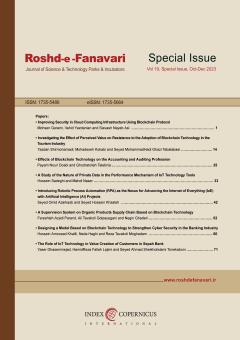The Effects of Blockchain Technology on the Accounting and Auditing profession
Subject Areas : Technology Management
Payam Noori Doabi
1
![]() ,
ghodratollah taleb nia
2
,
ghodratollah taleb nia
2
1 - Science and Research Branch, Islamic Azad University
2 - Science and Research Branch, Islamic Azad University
Keywords: Technology, Blockchain, Accounting, Auditing.,
Abstract :
After the Internet, blockchain technology has become a key factor in creative and innovative ideas and solutions in the financial sector due to its wide application potential and its numerous implementations. The advent of blockchain creates new opportunities and challenges for ongoing auditing and real-time accounting. Blockchain, as a digital ledger in accounting and a large database for recording and processing decentralized distributed Internet-based data and peer-to-peer interactive networks, is based on consensus; which is accompanied by an innovative approach to business models, intermediaries, and stakeholders; but in many centers it is still shrouded in mystery. Therefore, considering the impact of the environment on accounting and auditing as well as the increasing development of technology, this research with a library method and with practical purposes to identify, promote and use blockchain technology, to describe and examine the features, benefits, applications, and limitations Blockchain technology and its effects on the accounting and auditing profession. The results of this study highlight the necessity, importance, impact and position of blockchain technology in the accounting and auditing profession due to the characteristics of this technology such as greater information transparency, disclosure, timeliness, reliability, cost-effectiveness, flexibility, risk reduction, elimination of intermediaries, Demonstrates easy and fast access, and immutability of information.
1. Abad-Segura, Emilio; Infante-Moro, Alfonso; González-Zamar, Mariana-Daniela; López-Meneses, Eloy. (2021). Blockchain Technology for Secure Accounting Management: Research Trends Analysis, Mathematics, 9 (14), 1631.
2. Alina Olaru, Elena. (2021). the Impact of Blockchain on the Accounting Profession, CECCAR BUSINESS REVIEW, No 4.
3. ALSaqa, Zeyad Hashim; Hussein, Ali Ibrahim; and Mahmood, Saddam Mohammed. (2019). the Impact of Blockchain on Accounting Information Systems, Journal of Information Technology Management, Vol. 11, No. 3.
4. Coyne, J.G. and McMickle, P.L. (2017), Can blockchains serve an accounting purpose, Journal of Emerging Technologies in Accounting, Vol. 14 No. 2, PP. 101-111.
5. Dutta, Saurav K. (2020). The Definitive Guide to Blockchain for Accounting and Business, Emerald Publishing Limited, UK.
6. Fullana, Olga and Ruiz, Javier. (2019). accounting information systems in the blockchain era.Available at SSRN: https://ssrn.com/abstract=3517142.
7. Garanina, Tatiana and Et al. (2021). Blockchain in accounting research: current trends and emerging topics. Accounting, Auditing & Accountability Journal, Emerald Publishing Limited.
8. Ibañez, Juan Ignacio and Bayer, Chris N. and Tasca, Paolo and Xu, Jiahua, (2020). REA, Triple-Entry Accounting and Blockchain: Converging Paths to Shared Ledger Systems. At SSRN: https://ssrn.com/abstract=3602207
9. Pascual Pedreño, Eladio; Gelashvili, Vera; Pascual Nebreda, Laura. (2021). Blockchain and its application to accounting, Intangible Capital, Vol 17, No 1.
10. Quade, Ryan A. (2021). Blockchain: The Transformation of Accounting, Vol 4, Issue 2.


